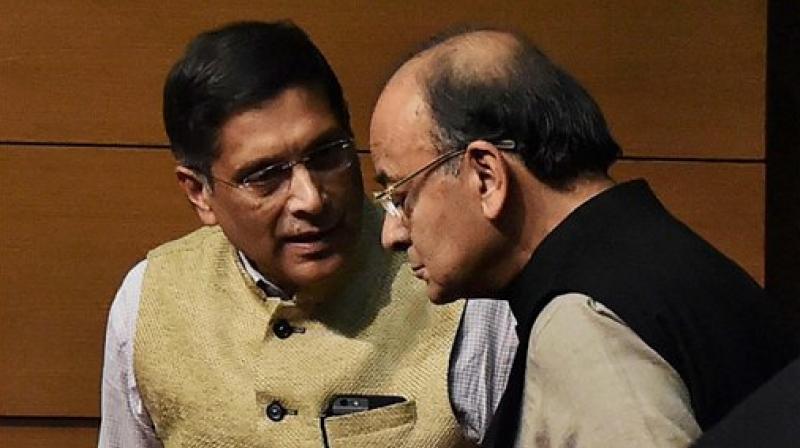Budget 2017: Health budget hiked by 28 pc; 5,000 PG seats to be created
The Government has prepared a plan to eliminate kala-azar and filariasis by 2017, leprosy by 2018, measles by 2020 and tuberculosis by 2025.

New Delhi: To ensure availability of specialist doctors at the secondary and tertiary levels, the Centre on Wednesday announced the creation of additional 5,000 post-graduate (PG) seats every year even as it increased the budget allocation for the health sector by almost 28 per cent.
The government also announced setting up of two more All India Institutes of Medical Sciences (AIIMS) in Jharkhand and Gujarat and asserted that it has prepared an action plan to eliminate kala-azar and filariasis by 2017, leprosy by 2018, measles by 2020 and tuberculosis by 2025.
The Centre said that while Drugs and Cosmetics Rules will be amended to ensure availability of drugs at reasonable prices, new rules for regulating medical devices will also be formulated soon while asserting that 1.5 lakh health sub-centres will be transformed into Health and Wellness Centres across the country.
According to the Union Budget 2017 presented by Finance Minister Arun Jaitley on Wednesday, the budget allocation for Health Ministry for 2017-18 is Rs 47,352.51 crore in comparison to allocation in 2016-17 of Rs 37,061.55 crore, an increase of 27.76 per cent from 2016. The revised allocation for 2016-17 was Rs 38,343.33 crore.
Jaitley in his speech said that the government is committed to take necessary steps for structural transformation of the regulatory framework of medical education and practice in India which includes several steps for increasing post-graduate medical seats.
"The government has prepared an action plan to eliminate kala-azar and filariasis by 2017, leprosy by 2018 and measles by 2020. Elimination of tuberculosis by 2025 is also targeted.
"Similarly, action plan has been prepared to reduce Infant Mortality Rate (IMR) from 39 in 2014 to 28 by 2019 and Maternal Mortality Rate (MMR) from 167 in 2011-13 to 100 by 2018-2020. 1.5 lakh health sub-centres will be transformed into Health and Wellness Centres," he said.
The allocation for Department of Health Research under the ministry too has been hiked for 2017-18 as it has been allotted Rs 1,500 crore from the previous year's allocation of Rs 1,144.80 crore. The revised allocation previous year was Rs 1,344.80 crore.
Jaitley said that to strengthen secondary and tertiary levels of health care, adequate availability of specialist doctors is needed.
"We have therefore decided to take steps to create additional 5,000 Post Graduate seats per annum. In addition, steps will be taken to roll-out Diplomate of National Board (DNB) courses in big district hospitals, strengthen PG teaching in select ESI and municipal corporation hospitals and encourage reputed private hospitals to start DNB courses," Jaitley said.
He said that two new All India Institutes of Medical Sciences (AIIMS) will be set-up in Jharkhand and Gujarat.
Health Minister JP Nadda said that enhanced allocation to health sector in the budget will strengthen activities of the ministry towards providing universal health care.
"Draft medical devices rules have been in vogue for quite some time. It is encouraging to see that the Government will seek to introduce some regulations in the coming year" said Anand Mehta, Partner, Khaitan & Co.
Anjan Bose, Secretary General, NATHEALTH, said "The Budget clearly focuses on improving healthcare access for the less privileged and on "preventive & wellness" both of which are very encouraging. Target of transforming 1.5 lakh health sub-centres into health wellness centres is in line with the need of the hour for the Indian citizens."
Aadhaar-linked health cards for senior citizens and the proposal to increase number of post-graduate medical seats are some of the welcome steps in the Budget, said Prathap C Reddy, Chairman, Apollo Hospitals Group.
"While we were hopeful that healthcare would be accorded a national priority sector status, the structural reform in medical education, in particular the increase in the number of post graduate medical seats and DNB courses is praiseworthy as it was long-awaited.
"The amendment in costs of life-saving drugs and harmonisation of rules for medical devices will all add up to have a positive impact for healthcare in the country," Reddy said in a statement in Hyderabad.
He said the Budget's focus on improving the growth trajectory of the economy, its pronounced thrust on rural development alongside ensuring fiscal consolidation, will certainly have a positive impact in fiscal administration and set the stage for clean and good governance.
"Furthermore, a target of 2025 has been set for the elimination of TB apart from other diseases such as filiaria, leprosy, measles and kala azar are all being targeted, which is a key need of the day in addition to addressing the onslaught of NCDs," Reddy said.
The Budget is not a game changer though it is a positive one, said Satish Reddy, Chairman, Dr Reddy's Lab.
He said there is no strong thrust to bolster the healthcare sector, apart from a mention about improving rural health infra with 1.5 lakh sub-centres being upgraded to health and wellness centres and setting up of two more AIIMS.
"Some amendments have been proposed to the Drugs and Cosmetics Act to provide a fillip for generic medicines but the details need to emerge on what exactly is being proposed. That said, one hoped for more decisive announcements to boost the sector, which did not happen," Satish Reddy said.
The abolition of the Foreign Investments Promotion Board is a big move as it was an impediment to FDI. Initiating reforms have been talked about in this area to increase fund flows into the economy, so we will need to see how the new policy unfolds," he said.
The issue of political funding was addressed at last by capping cash donations. The introduction of electoral bonds is also a welcome move, he added.

